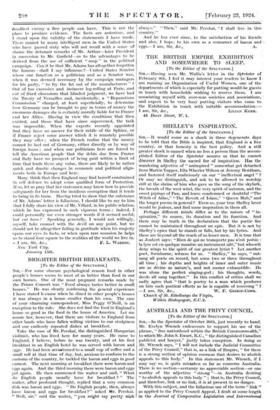SHELLEY'S INSPIRATION.
[To the Editor of the SPECTATOR.] SIR,—It would come as a shock in these degenerate days to be told that the Bible is inspired, that England is a free country, or that honesty is the best policy. And a still greater shock is caused when no less a person than the accom- plished Editor of the Spectator assures us that he cannot discover in Shelley the sacred fire of inspiration. Has the wandering adjective of " uninspired " somewhat got detached from Martin Tupper, Ella Wheeler Wilcox or Jeremy Bentham, and fastened itself maliciously on our " ineffectual angel " ? Or may we distinguish, and ask to be allowed to worship still at the shrine of him who gave us the song of the skylark, the breath of the west wind, the very spirit of autumn, and the sweet pipings of Pan, and leave condemned or doubtful "The Witch of Atlas," " The Revolt of Islam," " Queen Mab," and the longer poems in general? Even so, your true Shelley lover would be jealous, and find some inspiration in them all.
Perhaps different minds differ as to the nature of " in- spiration," its source, its duration and its function. And there may be truth in the declaration that the poetic fire cannot be maintained throughout an epic. But it is not by Shelley's epics that he stands or falls, but by his lyrics. And these are beyond all the reach of us lesser men. It is true that as Joubert says : "Rien de qui ne transporte pas n'est poesie : la lyre est en quelque maniere un instrument aile," but who will deny wings to the spirit of our greatest lyrist ? Let another poet, Swinburne, witness for us. " Shelley," he says, " out- sang all poets on record, but some two or three throughout all time ; his depths and heights of inner and outer music are as divine as nature's, and not sooner exhaustible. He was alone the perfect singing-god ; his thoughts, words, deeds all sang together." In this conflict of critics shall we sadly agree that " that is poetry to a man which produces on him such poetical effects as he is capable of receiving " ?










































 Previous page
Previous page